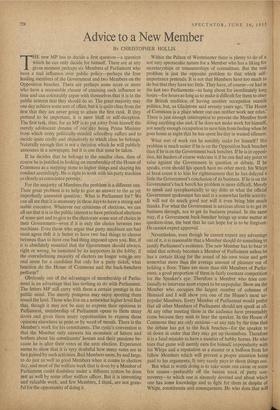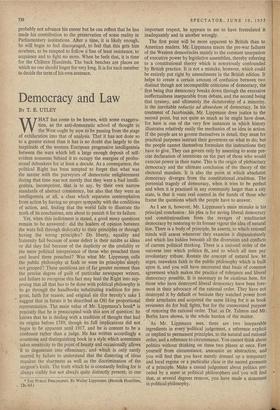Advice to a New Member
BY CHRISTOPHER HOLLIS THE new MP has to decide a first question—a question which he can only decide for himself. There are at any given moment perhaps six Members of Parliament who have a real influence over public policy—perhaps the four leading members of the Government and two Members on the Opposition benches. There are perhaps some score or more who have a reasonable chance of attaining such influence in time and can colourably argue with themselves that it is in the public interest that they should do so. The great majority may one day achieve some sort of office, but it is quite clear from the first that they are never going to attain the first rank. If they pretend to be important, it is mere bluff or self-deception. The first task, thtn, for an MP is to put away from himself the merely adolescent dreams of one day being Prime Minister from which every politically-minded schoolboy suffers and to decide quite coolly and objectively to which class he belongs. Naturally enough that is not a decision which he will publicly announce in a newspaper, but it is one that must be taken.
If he decides that he belongs to the smaller class, then of course he is justified in looking on membership of the House of Commons as a stepping stone to higher things and shaping his conduct accordingly. He is right to work with his party machine as closely as conscience permits.
For the majority of Members the problem is a different one. Their great problem is to help to give an answer to the as yet imperfectly answered question : What is Parliament for? We can all see that it is necessary in these days to have a strong and stable executive. Whatever our criticisms of elections, we can all see that it is in the public interest to have periodical elections of some sort and to give to the electorate some sort of choice in their Government—even if it is only the choice between two machines. Even those who argue that party machines are bad must agree tilt it is better to have two bad things to choose between than to have one bad thing imposed upon you. But, if Within the Palace of Westminster there is plenty to do of a not very spectacular nature for a Member who has a liking for secretaryships or treasurerships of committees. But the real problem is just the opposite problem to that which self- importance pretends. It is not that Members have too much to do but that they have too little. They have, of course—or had in the last two Parliaments—to hang about for inordinately long hours—for hours so long as to make it difficult for them to obey the British tradition of having another occupation outside politics, but, as Gladstone said seventy years ago, 'The House of Commons is a place where one can neither work nor relax.' There is just enough interruption to prevent the Member from doing anything else and, if he does not make work for himself, not nearly enough occupation to save him from feeling when he goes home at night that he has spent his day in wasted idleness.
What sort of work can he sensibly make for himself? His problem is much easier if he is on the Opposition back benches than if he is on the Government back benches. If he is in opposi- tion, his leaders of course welcome it if he can find any point to raise against the Government in question. or debate. If he speaks, even should his speech have no other merit, his Whips at least.count it to him for righteousness that he has delayed a little the Government's conclusion of its business. If he is on the Government's back bench his problem is more difficult. Merely to speak and sycophantically to say ditto to what the official Government spokesman has said is a somewhat feeble activity. It will not do much good nor will it even Ming him much thanks. For what the Government is anxious about is to get its business through, not to get its business praised. In the same way, if a Government back-bencher brings up some matter at question-time, the best that he can hope for is to be forgiven. He cannot expect approval. probably not advance his career but he can reflect that he has made his contribution to the preservation of some reality in Parliamentary institutions. After a time, it is likely enough, he will begin to feel discouraged, to feel that this gets him nowhere, to be tempted to follow a line of least resistance, to acquiesce and to fight no more. When he feels that, it is time for the Chiltern Hundreds. The back benches are places on which no one should linger for very long. It is for each member to decide the term of his own sentence.











































 Previous page
Previous page